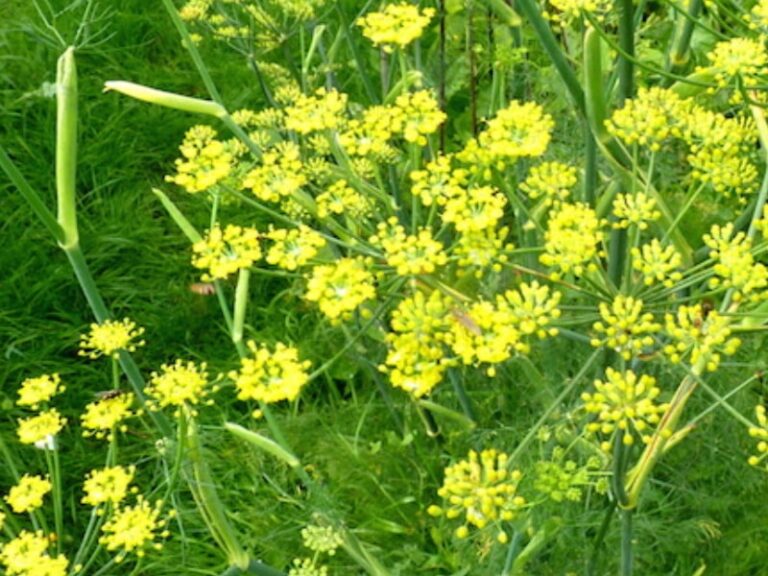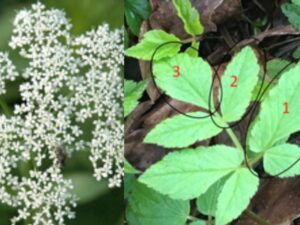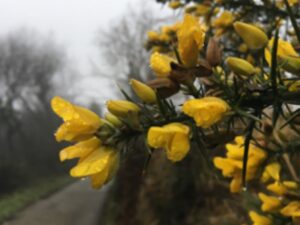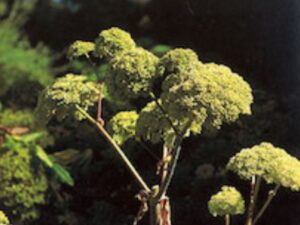Fennel – Foeniculum vulgare
The huge plant I was trying to see past. Big, bold and beautiful, full of flowers with many industrious insects buzzing about them, by the end of this month the flowers will have turned into ripe seed pods ready for gathering.
Although Fennel is not a true indigenous plant to Britain it has naturalised near southern, eastern and western coasts of England and Wales.
Mankind has been using this plant for over 2000 years, we use the leaves stems and seeds in modern herbal medicine to calm and sooth the digestive and respiratory system. It is thought to be useful alongside diets to help with weight loss by stimulating the metabolism and aiding digestion and absorption. It has a calming effect on the gut and soothes and eases an irritable bowel and is a gentle warming herb to help delicate tummies – especially good for windy colic in infants. Also used to help bring on milk in nursing mothers. So we have here a very gentile but effective herb which is also used in cough remedies to bring up stubborn phlegm and the best part is it tastes wonderful. Externally it can be used as an eye wash for red-eye and blepharitis. To make a lotion for this use ½ a teaspoon of crushed seeds in a cup of cold water. Leave to infuse for 1 hour, strain. Half fill an eye bath and use as a douche.
In folklore fennel was used as an anti-witch and safeguarding plant. It was hung over doors in midsummer to protect from enchantment. The leaves were included in wreaths of victory. A sprig of fennel put in a horse’s harness will help keep the flies away.
Fennel is an excellent herb to use when cooking any fish especially mackerel.
Jayne
Recipe
Here is a flavoursome jelly to add to your autumn collection:- Fennel Orange and Lemon Jelly – from Herb Sufficient by Christina Stapley
3 cups of sugar
Juice of 1 lemon
½ cup of herb infusion
100ml of liquid pectin
Pure orange juice
Pour 1 cup of boiling water over 4 tablespoons of chopped fennel leaf into an enamel pan. Simmer gently for 10 minutes until the liquid is reduced by half. Meanwhile put the sugar into a preserving pan and pour the juice of a good sizes lemon into a cup. Fill the remainder with pure orange juice and pour the mixed fruit juices over the sugar. Add the strained herb infusion and set on a low heat.
Prepare 2 jars by sterilising them and keep them warm, while stirring the jelly until the sugar has dissolved. Bring to the boil and stir in the liquid pectin. Boil quickly for 2 minutes. Skim if necessary. Cool a little before pouring into jars, seal and label.
Enjoy.
And finally
Poem for this month again by my good friend Nadia Kingsley:-
Fennel
Five feet – some
Up through your borders
Prefers plenty of sun
(A true Italian)
Polished stem
Leaves like thin dill
Clustered gold flowers
As flattened umbrellas
Grows in the dry, though
Thrives by sea or stream
Hang it from your lintel
To ward off witches
Accept its gifts:
Longevity, and Courage
Foodplant of caterpillars
Known for its digestive traits
Fennel gets a fat man thin, and
Thin man through his famine
I like its best for its aniseed taste
Grilled with fish. Raw in a salad.




